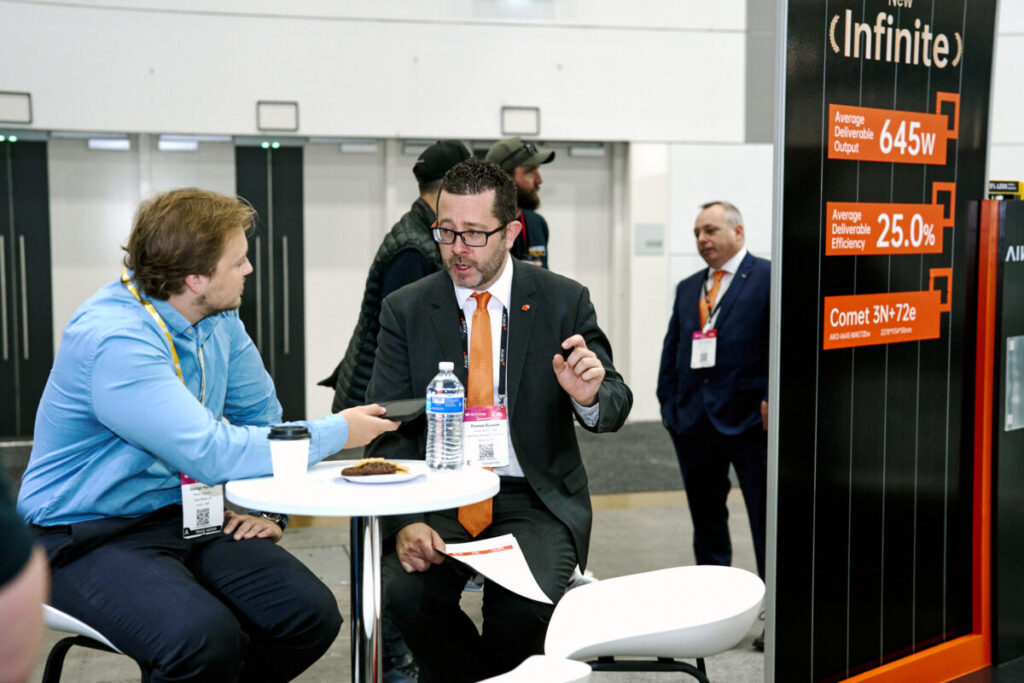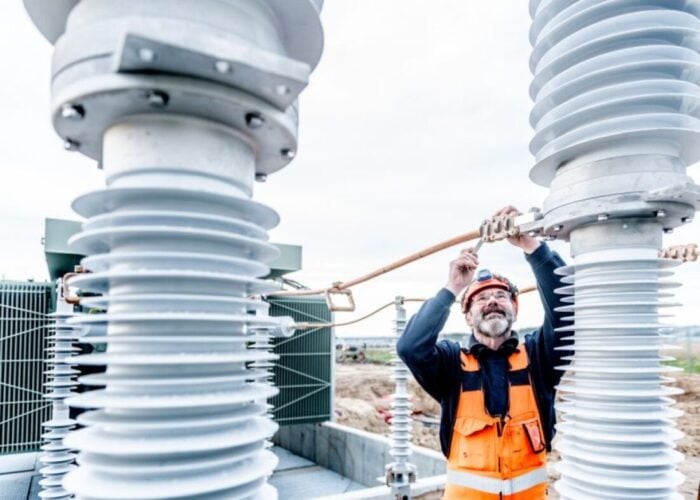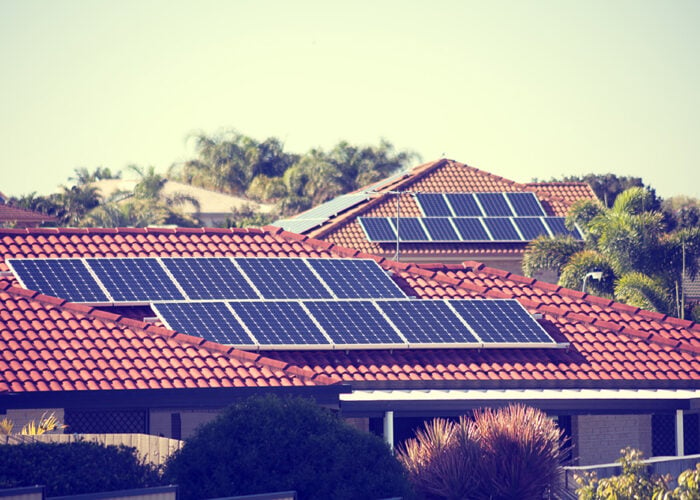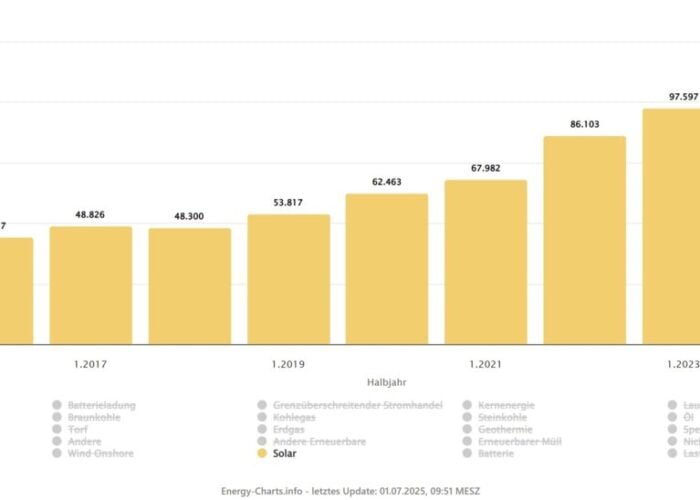
Aiko Solar first entered the Australian market in March 2024, with the organisation having signed supply deals for 2GW of its GEN 2 n-type all back contact ABC modules. The Chinese manufacturer signed deals with solar distributors Solar Juice, AC Solar Warehouse, Sol Distribution, and Tradezone, totalling 2GW.
More recently, the company has partnered with the Australian Centre for Advanced Photovoltaics (ACAP) to launch a US$4 million initiative aiming to achieve 30% efficiency with interdigitated back contact (IBC) solar cells. The ACAP was founded by Professor Martin Green, a recipient of a Queen Elizabeth Prize for Engineering.
Unlock unlimited access for 12 whole months of distinctive global analysis
Photovoltaics International is now included.
- Regular insight and analysis of the industry’s biggest developments
- In-depth interviews with the industry’s leading figures
- Unlimited digital access to the PV Tech Power journal catalogue
- Unlimited digital access to the Photovoltaics International journal catalogue
- Access to more than 1,000 technical papers
- Discounts on Solar Media’s portfolio of events, in-person and virtual
PV Tech spoke with Thomas Bywater, Aiko Solar’s country director for Australia, New Zealand, NC, and Fiji, at All-Energy Australia 2024 in Melbourne to learn more about the company’s expansion plans in Australia and some of its latest products.
PV Tech: Can you please explain where Aiko currently fits into the Australian market? What are some of the opportunities and obstacles you see here?
The Aiko Solar product is cutting-edge. Because it is a leading technology, it is also considered a premium option for people. However, in contrast to other high-tech offers that have come in the past, the price point is not that much different from the standard modules, such as the older types on the market.
We see Aiko just slightly above the mainstream brands that people have used for common types of panels. We also sit in the space of saving time. We’re not just another panel. We offer the installers a way to save on installation time and space so they can show their expertise to the end user.
Can you talk me through some of your new products? The new Neostar 475W Panel and the Infinite Modules are coming out next year…
We are the only manufacturer to offer a product under two square meters at 475W. Our wholesalers in the country have this product readily available today. Many people talk about their products, but they either don’t have them or cheat—they make them bigger than they are now. We’ve got a genuine offer to the market to give them the best they can buy worldwide, right here in Australia.
If we look at the Infinite module, we’re discussing the future. Not only do we have the best product right now, but we will also have the best product next year. So, just as the others catch up to us, we will launch the Infinite. The new modules use a clever layout to ensure that most of the modules are making energy.
Many modules have gaps between the solar cells and metal busbars on the front. We are relocating these components to the back of the module. This means the cell contacts and the module busbars will now be positioned at the rear. That’s a clever use of current technology to make it work better, and it will give the installers more power, so they will not have to install as many modules.
What does Aiko hope to achieve in the Australian market? What would a successful next five years look like for the company?
If we look at our launch in Australia, we’ve successfully attracted the attention of premium installers. We hope to give homeowners a clear path to understanding who the good installers are and what the good product is. If you’re working with someone who understands and installs Aiko, they’re also good installers, so you get a great outcome on your system.
We’re hoping to achieve a clear segregation of that market so that people look at our installers and say “these guys know what they’re doing” because they’re using Aiko products.
We also want to offer them time savings. If you have an efficient panel, it means less racking and less time on the roof. By making the modules more compact, we can make the systems more efficient and cut some of their costs.
From a global perspective, why do you believe the Australian market has so much potential?
In the global context, Australia is important for two reasons. One is the sun. Australia’s solar resources are second to none, particularly in location and population. Whereas Saudi Arabia may have a lot of sun, it doesn’t have that population in the desert. In Australia, where it’s hot and sunny, we have a lot of population and industrial output.
For example, if we look at the Pilbara, our mining region in Western Australia, it is very sunny, and they need energy. Exhibitors here at All-Energy Melbourne 2024 have electric vehicle (EV) chargers for mining trucks. We will see batteries in the railways and other modes of public transport. We’re seeing battery-powered trams in Newcastle now, and that’s all electrification. Australia is ahead of the curve in electrification in industrial assets and transport.
Another positive impact on the Australian market is that governments like Victoria are cutting out gas. That is an excellent signal to the solar market that there are many opportunities here.
We also have a strong workforce here. Many tradies understand solar PV technologies, meaning we can deploy solar cheaper than in other regions, such as America. It has only been recently that it has become more affordable to deploy rooftop solar PV in China than in Australia. Our workforce knows what they’re doing, and it’s a mature market.
As a final point, we’re now looking at replacement systems. Often, these systems are 25 years old and need to be recycled. Because of this, we’re installing better systems or adding to systems that are already out there. There’s a powerful add-on and retrofit market here in Australia.
Aiko is celebrating its 15th anniversary. Congratulations! What are some of the biggest changes the company has seen with its inauguration?
The Aiko business started in aluminium 25 years ago, and we’ve been doing solar for 15 years. Across that time, we’ve gone from mono to poly, back to mono perc again, through to TOPCon, and now we’re going into all-back contact (ABC).
A few years ago, we recognised that with TOPCon, you cannot improve it much more than where it is with the metal on the front of the module. So, we started working on our own robots to manufacture the back contact cell. Much of the equipment that makes the common modules is on the broader market; it’s open to all manufacturers.
In contrast, we have made our all-back contact technology in-house, which protects us. From a competition point of view, we’ll be the only one or one of the few companies with that technology. We think looking back across our 15 years, the progress is excellent.
What key message would you like our audience to take away from this interview?
I think the future is bright, and the reason is that we’re making progress—even in the mature Australian industry. If you want to succeed as a business, join us. We’re getting better every day. Come and get better with us.







